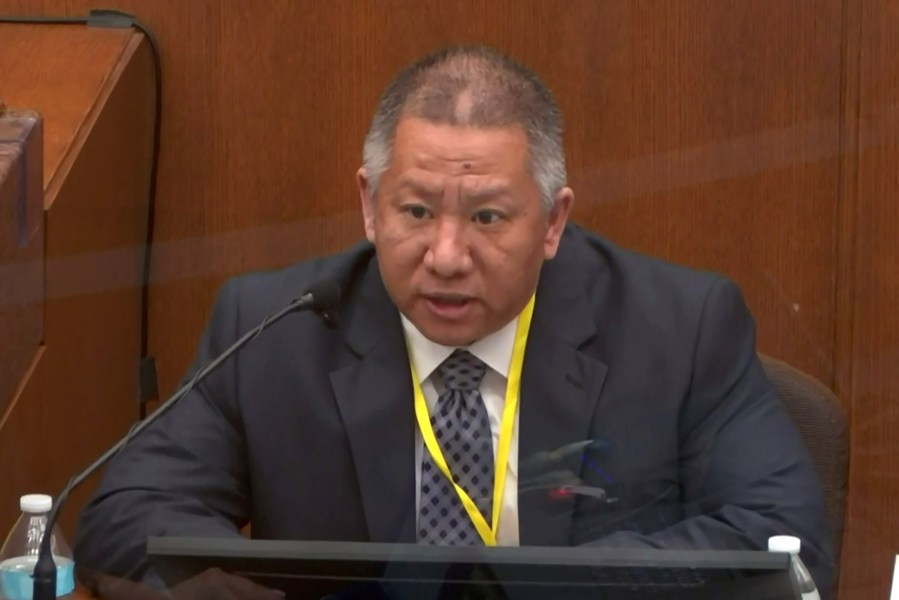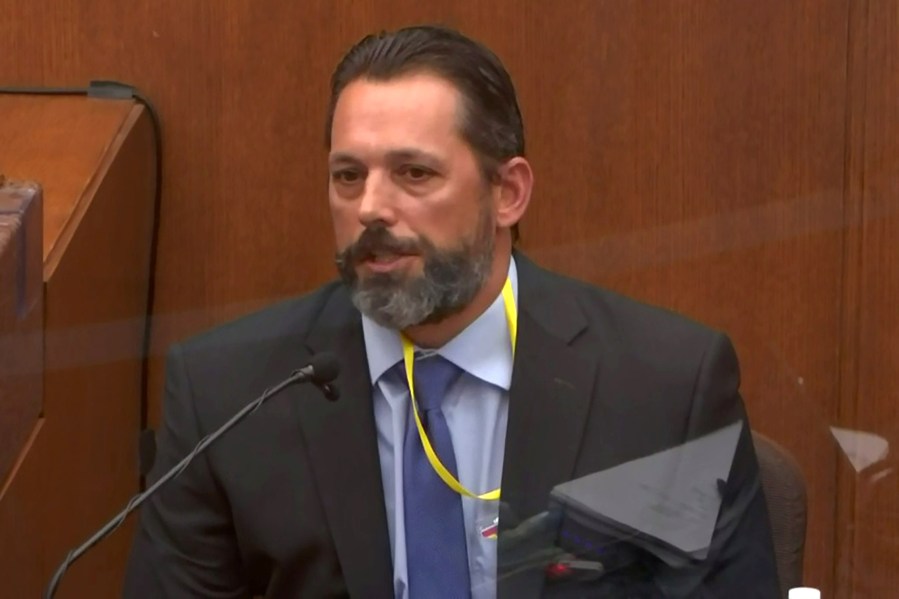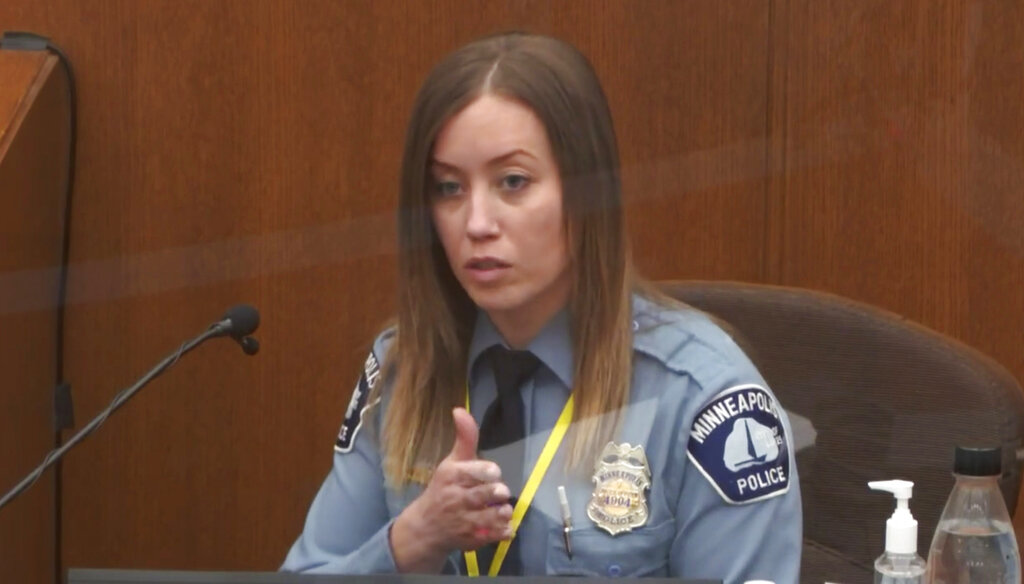MINNEAPOLIS (NewsNation Now) — Prosecutors in Derek Chauvin’s murder trial called more expert witnesses Tuesday, including police officials who testified in regards to police de-escalation and use-of-force training.
Before the jury was brought in on the seventh day of trial, the passenger in the vehicle with Floyd at the time of his arrest made an appearance in court.
NewsNation will provide live coverage of the trial online and the NewsNation Now app. You can watch the trial here.
Morries Hall, Floyd’s passenger
Chauvin’s defense team subpoenaed a man who was in the car with Floyd when police arrived, telling the jury he would testify that Floyd took opioid pills before the arrest and appeared to fall into a deep sleep at some point.

The man, Morries Hall, has asked Hennepin County District Judge Peter Cahill to quash the subpoena, saying he would invoke his constitutional right against self-incrimination if he had to appear on the witness stand.
Hall attended the hearing on his request via a video link from the county jail, where he is being held on unrelated charges of domestic abuse, according to court and county jail records.
Defense attorneys’ questions for Hall have the potential to incriminate him which is why Hall said he didn’t want to testify and would invoke his Fifth Amendment right.
Cahill decided that most of the questions Chauvin’s attorney, Eric Nelson, wanted to ask could incriminate Hall. Even so, the judge said Hall should be able to testify on Floyd’s condition in the car and whether he fell asleep suddenly after possibly taking opioid pills.
“I don’t see how that would put him closer to criminal liability, just from those observations,” Cahill said, giving Nelson until Thursday to draft potential questions.
Sgt. Ker Yang, Crisis Intervention Training
The first witness to take the stand Tuesday said four years before Floyd’s death, Chauvin took a 40-hour course on crisis intervention that included training on how to recognize people in crisis and how to use de-escalation techniques to calm them down.

Sgt. Ker Yang, a crisis intervention training coordinator with the Minneapolis Police Department, became the latest member of the department to testify that Chauvin failed to follow his training when he put his knee on Floyd’s neck.
Yang said that officers are taught to use principles such as neutrality, respect and trust in making critical decisions in dealing with people in crisis, including those suffering mental problems or the effects of drug use, and then defuse the situation.
According to testimony and records submitted by prosecutor Steve Schleicher Tuesday, Chauvin took a 40-hour course in 2016 on how to recognize people in crisis — including those suffering mental problems or the effects of drug use — and how to use de-escalation techniques to calm them down.
“When we talk about fast-evolving situations … a lot of the time we have the time to slow things down and reevaluate and reassess and go through this model,” Yang said.
Use-of-Force Instructor Lt. Johnny Mercil
Use-of-force instructor Minneapolis Police Lt. Johnny Mercil testified that he trained Chauvin in defensive tactics in 2018. Mercil stated force should be proportional to resistance and that the “least amount of force necessary to meet your objectives” should be used. Mercil was also asked to describe hand-cuffing and neck restraint techniques.

Pool via REUTERS
Schleicher showed a still image taken from a bystander video of Chauvin with his knee on Floyd’s neck — one that jurors have seen several times — and asked Mercil: “Is this a use of force?”
“Yes sir,” Mercil replied.
Mercil said officers are trained in how to get control of a suspect by using their arms on the side of a person’s neck to slow blood flow to the brain. He said officers are not taught to use their legs or knees, though a knee on the neck can happen depending on a person’s resistance.
Schleicher asked if the neck restraint could be used if the person was under control and handcuffed.
“I would say no,” Mercil said.
mpd medical support coordinator NICOLE MACKENZIE

Minneapolis Police Department medical support coordinator and police officer Nicole Mackenzie took the stand Tuesday afternoon.
Mackenzie said her primary responsibility is first aid education for new officers and current officers and training on Narcan, which is administered in the event of an overdose.
Chauvin had been certified to perform CPR, and Mackenzie testified that police department policy required him to start aid before paramedics arrived, if possible.
“If there is no pulse, you begin CPR immediately,” said Mackenzie.
Mackenzie also testified that just because an arrestee can speak does not mean that they are able to breathe, saying, “just because they’re speaking doesn’t mean they’re breathing adequately.”
Mackenzie is expected to be called to the stand again next week when the defense makes their case.
Los Angeles Police Sergeant Jody Stiger
Jody Stiger, a Los Angeles Police Department sergeant serving as a prosecution use-of-force expert testified Tuesday. Stiger said officers were justified in using force while Floyd was resisting their efforts to put him in a squad car. But once he was on the ground and stopped resisting, “at that point the officers … should have slowed down or stopped their force as well.”
Stiger said that after reviewing video of the arrest, “my opinion was that the force was excessive.”
The trial paused for the day in the middle of Stiger’s testimony. The trial will resume Wednesday at 10:30 a.m. EDT.
Chauvin, who is white, has argued he followed police training when he kept his knee pushed into Floyd’s neck for more than nine minutes as the handcuffed 46-year-old Black man fell limp and stopped breathing.
“I vehemently disagree that that was appropriate use of force for that situation on May 25,” Chauvin’s former boss, Minneapolis Police Chief Medaria Arradondo, testified on Monday.
Arradondo told the jury that Chauvin’s training required him to stop the restraint and provide first-aid treatment while waiting for an ambulance to arrive.
Chauvin has pleaded not guilty to murder and manslaughter charges for Floyd’s arrest, which happened on suspicion that Floyd used a fake $20 bill to buy cigarettes on May 25, 2020.
The county medical examiner ruled Floyd’s death a homicide at the hands of the police, and noted Floyd had also taken the fentanyl and methamphetamine before his death. Chauvin’s lawyers argue that Floyd’s death was really a drug overdose. Prosecutors from the Minnesota Attorney General’s office said medical evidence would contradict that.
The emergency room doctor who pronounced George Floyd dead after trying to resuscitate him testified Monday that he theorized at the time that Floyd most likely died of suffocation.
Based on the information he had and medical tests, Dr. Bradford Langenfeld, who was a senior resident on duty that night at Hennepin County Medical Center, thought it was unlikely that Floyd suffered a heart attack, he told the jury. The most likely explanation, the doctor said, was asphyxia.
Floyd’s girlfriend, Courteney Ross, testified last week that she and Floyd struggled with opioid addiction, and that she thought Hall sometimes illegally sold pills to Floyd.
The Associated Press and Reuters contributed to this report. Reporting by Jonathan Allen and Brendan O’Brien of Reuters. Reporting by Amy Forliti, Steve Karnowski and Tammy Webber of Reuters.
